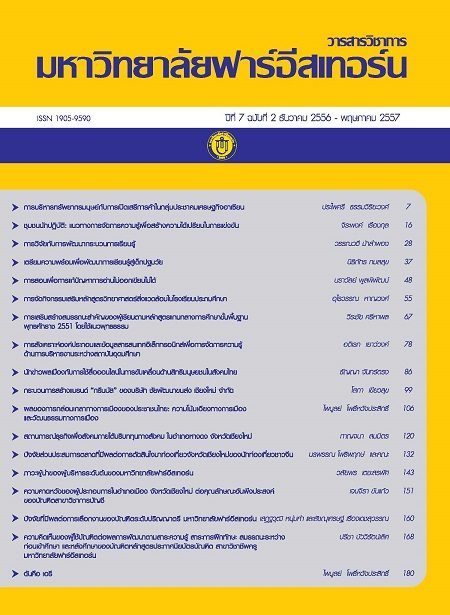ชุมชนนักปฏิบัติ: แนวทางการจัดการความรู้เพื่อสร้างความได้เปรียบในการแข่งขัน
Main Article Content
Abstract
องค์การได้นำแนวคิดการจัดการความรู้เข้ามาใช้เพื่อเพิ่มความสามารถในการแข่งขัน การจัดการความรู้ ที่มุ่งเน้นการแลกเปลี่ยนเรียนรู้กันในเครือข่ายของคนผู้ซึ่งมีความสนใจในสิ่งใดสิ่งหนึ่งร่วมกัน เป็นสิ่งที่ช่วยสร้างคุณค่า ให้กับองค์การเป็นอย่างมาก แนวทางการจัดการความรู้ที่เรียกว่า “ชุมชนนักปฏิบัติ” จึงถูกนำมาใช้ในการจัดการ ความรู้กันอย่างแพร่หลายมากยิ่งขึ้น บทความนี้ได้ทบทวนแนวคิดทั่วไปเกี่ยวกับการจัดการความรู้ แนวคิดเกี่ยวกับ ชุมชนนักปฏิบัติ จากนั้นได้นำเสนอกระบวนการพัฒนาชุมชนนักปฏิบัติ ซึ่งครอบคลุมการเตรียมการจัดตั้งชุมชน การกำหนดบทบาทหน้าที่และความรับผิดชอบ การอำนวยความสะดวกและจัดหาพื้นที่ การดำเนินกิจกรรมของชุมชน การติดตามและประเมินผล และการรักษาความต่อเนื่องของชุมชน ในตอนท้ายของบทความได้กล่าวถึงปัจจัยแห่ง ความสำเร็จของการพัฒนาชุมชนนักปฏิบัติ ซึ่งได้แก่ ความไว้วางใจของสมาชิกในชุมชนเอง การได้รับการสนับสนุน จากผู้บริหารระดับสูง และการมีเทคโนโลยีที่สนับสนุนการดำเนินงาน
Organization has adopted the concept of knowledge management to increase the competitive advantage. Knowledge management that focused on knowledge sharing in the network of people who are common interested was created the value for organization. Therefore, the knowledge management approach which is called communities of practice had been widely used. This article was reviewed the general concepts of knowledge management and communities of practice. Then, to point out the process of the development of communities of practice, including, the establishment of the communities, defining the roles and responsibilities, facilitating and acquisition, the activities in the communities, monitoring and evaluation, and maintaining the continuity of the communities of practice. Key success factors of the development of communities of practice such as the community members’ trust, the supporting of senior management, and the providing of appropriate technology to support their operations were suggested in the last section of this paper.
Article Details
1. Any views and comments in the Journal of Social Innovation and Lifelong Learning are the authors’ views. The editorial staff have not to agree with those views and it is not considered as the editorial’s responsibility.
2. The responsibility of content and draft check of each article belongs to each author. In case, there is any lawsuit about copyright infringement. It is considered as the authors’ sole responsibility.
3. The article copyright belonging to the authors and The Far Eastern University are copyrighted legally. Republication must be received direct permission from the authors and The Far Eastern University in written form.

